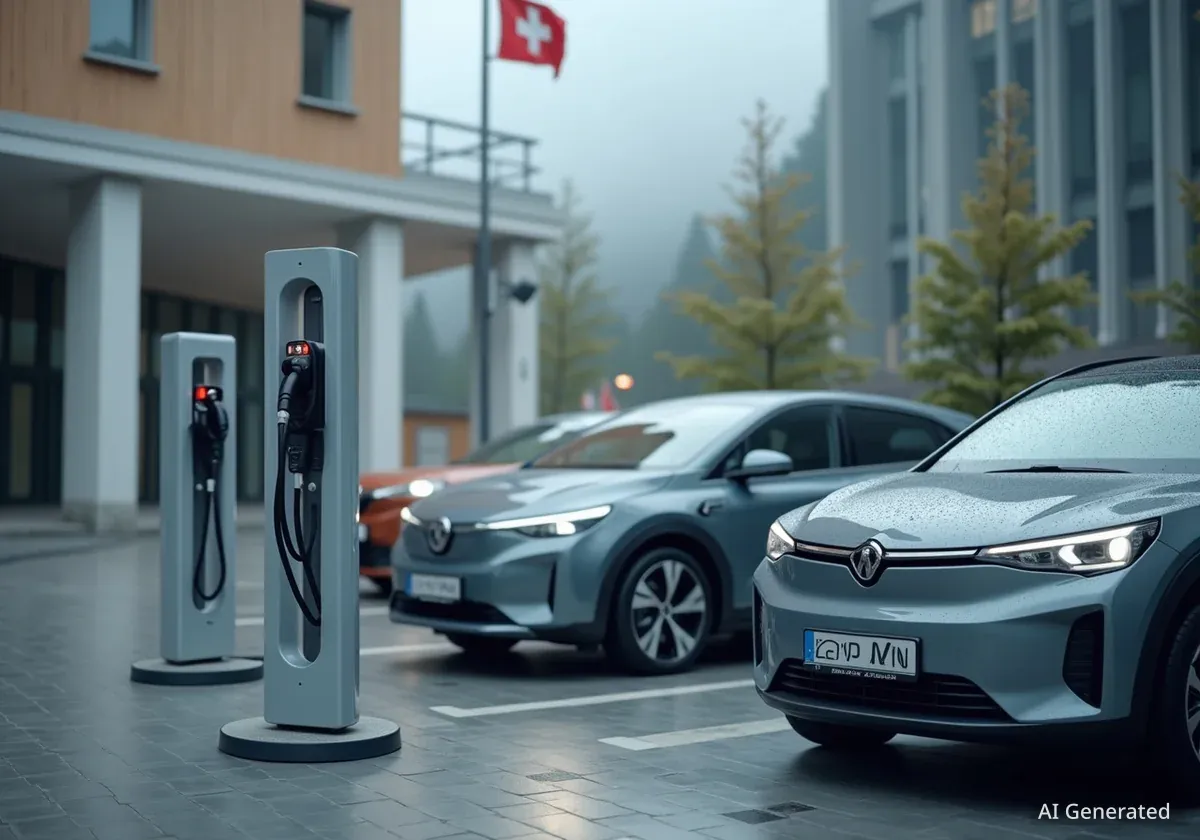The Swiss Federal Council has initiated a consultation process for two proposals aimed at taxing electric vehicles (EVs) starting in 2030. These measures seek to ensure stable funding for road infrastructure as mineral oil tax revenues decline with the increasing adoption of EVs. The proposals maintain the principle that those who use the roads should contribute to their upkeep.
Key Takeaways
- Swiss Federal Council proposes two EV tax models.
- Goal is to compensate for lost mineral oil tax revenue.
- Proposals include a mileage-based fee and a charging current tax.
- New taxation is planned to begin in 2030.
- A constitutional amendment and public vote may be required.
Road Infrastructure Funding Model
Currently, Switzerland's federal road infrastructure is entirely funded by its users. The primary source of this funding is the mineral oil tax. This tax supports the National Road and Agglomeration Traffic Fund (NAF) and the Special Road Traffic Fund (SFSV). Approximately half of the basic mineral oil tax also goes into the general federal budget.
However, electric vehicle owners do not pay this specific tax. As more drivers switch to electric vehicles, the revenue generated from mineral oil taxes is decreasing. This decline creates a funding gap for road maintenance and development.
Fact: Mineral Oil Tax
The mineral oil tax is Switzerland's largest single source of road infrastructure funding. It ensures that those who benefit from the roads contribute to their construction and upkeep.
Addressing Revenue Shortfalls
The Federal Council aims to offset these revenue losses by introducing a comparable tax for electric vehicles. This strategy intends to secure current funding levels and uphold the established user-pays principle. This principle states that those who use the road infrastructure are responsible for financing it.
Maintaining financial stability for road networks is critical for Switzerland's economy and daily life. Roads facilitate commerce, tourism, and daily commutes. Ensuring their quality requires consistent funding.
The Need for New Revenue Streams
The shift towards electric mobility is a positive step for the environment. However, it presents a challenge for traditional funding models. Finding new, equitable ways to finance infrastructure is essential for the long term. The Federal Council's proposals directly address this emerging issue.
Two Proposed Taxation Models
To achieve its goal, the Federal Council has opened a consultation on two equal proposals. These proposals offer different methods for taxing electric vehicles.
Variant 1: Mileage-Based Fee
The first option is a mileage-based fee. Under this system, vehicle owners would pay a charge based on the kilometers driven in Switzerland. The fee per kilometer would depend on the vehicle type and its total weight. Heavier vehicles would incur a higher tariff.
"The tariff per kilometer would be determined by the vehicle's type and its total weight – the heavier the vehicle, the higher the tariff," states the Federal Roads Office (ASTRA).
For an average car, the proposed tariff is approximately 5.4 centimes per kilometer. This model directly links the cost to how much a vehicle uses the road network.
Context: User-Pays Principle
The user-pays principle is a fundamental concept in Swiss infrastructure financing. It ensures that the costs of public services, like roads, are borne by those who benefit from them. This principle promotes fairness and efficient resource allocation.
Variant 2: Charging Current Tax
The second option is a tax on the electricity used to charge electric vehicles in Switzerland. This tax would apply to the amount of electricity supplied to charging stations. It would be collected at both public and private charging points.
The proposed tariff for this variant is 22.8 centimes per kilowatt-hour (kWh). This rate would apply uniformly, regardless of the vehicle type. This approach taxes the energy input rather than the distance traveled.
Constitutional Amendment and Public Vote
The Federal Council intends for the revenue from this new tax to be used in the same way as the mineral oil tax. This means the funds would go to the National Road and Agglomeration Traffic Fund (NAF), the Special Road Traffic Fund (SFSV) – which includes contributions to cantons and the Railway Infrastructure Fund (BIF) – and the general federal budget.
Such a reallocation of funds requires an amendment to the Federal Constitution. Any change to the constitution must be put to a national popular vote. This means Swiss citizens will have the final say on the proposed tax system.
The consultation period for these proposals has now begun. It will run until January 9, 2026. The Federal Council aims for the taxation of electric vehicles to start in 2030.
Impact on Federal Finances
The current funding model has served Switzerland well for decades. However, the rise of EVs demands adaptation. Securing alternative revenue streams is vital to avoid future deficits in infrastructure spending. The proposed constitutional change reflects the long-term vision for sustainable funding.
- NAF: Supports national roads and urban agglomeration projects.
- SFSV: Funds specific road traffic initiatives, including cantonal contributions.
- BIF: Receives contributions, highlighting the interconnectedness of transport infrastructure.
- General Federal Budget: A portion supports broader government functions.
Looking Ahead to 2030
The implementation target of 2030 provides a clear timeline for these significant changes. The consultation process allows various stakeholders, including vehicle owners, environmental groups, and industry associations, to provide feedback. This feedback will help shape the final legislative proposal.
The Federal Council emphasizes the importance of a fair and sustainable financing model for Switzerland's vital transport networks. The proposals aim to ensure that all road users contribute equitably to the infrastructure they rely on daily.
Key Dates
Consultation period ends: January 9, 2026
Proposed taxation start: 2030
The Federal Roads Office (ASTRA) has made the consultation documents available on its website. These documents provide detailed information on both proposed variants and their potential impacts.
The debate around EV taxation is a global one, as many countries face similar challenges in adapting older funding models to new technologies. Switzerland's approach reflects a commitment to maintaining high-quality infrastructure while embracing sustainable mobility.




